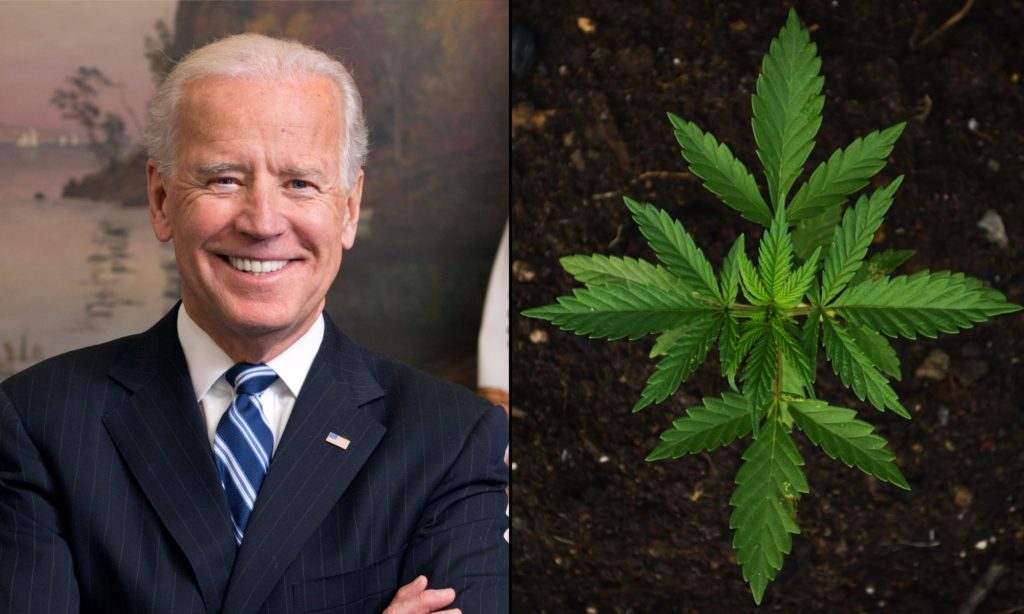By on MarijuanaMoment
The White House suggested on Friday that President Joe Biden will not be making any marijuana policy moves ahead of the midterm elections, with the press secretary saying that “I don’t have anything else to share in the upcoming weeks” when she was asked about other Democrats’ push for cannabis action by the administration.
During a gaggle with reporters aboard Air Force One, Press Secretary Karine Jean-Pierre was pressed on whether the president intended to talk about marijuana before the election, with the journalist pointing out that the topic is being raised by “a lot of his allies.”
Jean-Pierre acknowledged that questions about Biden’s plans for cannabis policy have routinely come up in press briefings and then reiterated that his position remains the same: leave adult-use legalization to the states, reschedule marijuana, federally decriminalize the plant and expunge prior records.
“The president believes that there are too many people serving unduly long sentences for non-violent drug crimes—a disproportionate number of whom are Black and brown,” the press secretary said.
However, while marijuana reform is a strongly popular issue, especially among Democrats, she implied that he didn’t plan to leverage reform before the election that’s less than 10 weeks away.
Much of what Jean-Pierre said—including a reference to Biden’s clemency actions in April—echoed points she’s made in the past, though the specificity of how long not to expect the president to address cannabis is new.
The White House was similarly asked about Biden’s plans to fulfill his cannabis campaign pledges just two weeks ago, with the press secretary saying that she didn’t have “anything to announce today at this point” after being asked about a recent call to action by Pennsylvania Lt. Gov. John Fetterman (D), who is running for a U.S. Senate seat.
“This is something that he has talked about during the campaign, and you’ve heard from him many other times talking about his drug policy focus and what’s important to him,” she said at the time. “We just don’t have anything to speak to.”
Biden and Fetterman did briefly discuss marijuana policy reform during a meeting near Pittsburgh on Monday, and a campaign spokesperson for the Senate candidate said the two talked about cannabis scheduling and executive authority to enact reform.
The president made his first public comments on marijuana issues since taking office after being pressed in July on whether he plans to follow through on his campaign pledge to release people who are incarcerated over non-violent federal cannabis offenses.
Biden reiterated at the time that he doesn’t believe people should be locked up over cannabis use, said that his administration is “working on” fulfilling that clemency promise and vaguely alluded to a crime bill that he suggested would address the issue.
Throughout his tenure, Biden has received about a dozen letters from lawmakers, advocates, celebrities and people impacted by criminalization to do something about the people who remain behind federal bars over cannabis.
Six senators—including Sens. Elizabeth Warren (D-MA), Bernie Sanders (I-VT) and Cory Booker (D-NJ)—sent a letter to Biden in July to express their frustration over the administration’s “failure” to substantively address the harms of marijuana criminalization and use executive clemency authority to change course.
They said that the administration’s current stance is “harming thousands of Americans, slowing research, and depriving Americans of their ability to use marijuana for medical or other purposes.”
The recently appointed U.S. pardon attorney also recently weighed in on the prospects of mass cannabis clemency, telling Marijuana Moment that her office handles cases independently, but it could be empowered to issue broader commutations or pardons if directed by the president.
The White House has been asked about the issue several times. Former Press Secretary Jen Psaki had said that the president has “every intention of using his clemency power” and is “looking at” relief for non-violent drug offenders.
Rahul Gupta, director of the Office of National Drug Control Policy (ONDCP), said in June that the Biden administration is “monitoring” states that have legalized marijuana to inform federal policy, recognizing the failures of the current prohibitionist approach.
Meanwhile, congressional lawmakers have continued to work legislatively to put an end to cannabis criminalization.
Senate Majority Leader Chuck Schumer (D-NY), Senate Finance Committee Chairman Ron Wyden (D-OR) and Booker filed a much-anticipated bill to federally legalize cannabis and promote social equity in July, and a Senate Judiciary subcommittee chaired by Booker subsequently held a hearing where members discussed the proposal.
But given the steep task of meeting the 60-vote threshold, the general expectation is that the comprehensive legislation will not advance this session, and conversations have pivoted toward putting together a package of more modest cannabis proposals such as protecting banks that work with marijuana businesses and expunging records of those residing in legal states.
For the time being, Senate Democrats are touting one piece of incremental marijuana reform legislation that passed the chamber back in April. The bipartisan bill is meant to streamline the process for scientists who want to access cannabis for research purposes.
That specific legislation hasn’t been enacted into law. But there are hopes that a slightly revised version that was introduced in July could reach the president’s desk in due time. It already cleared the House just days after its filing, and sources said the Senate is expected to act shortly.
If it makes it through the chamber and gets to Biden, who remains opposed to full federal marijuana legalization, it would mark the first piece of standalone marijuana reform legislation to ever become law.
A key U.S. senator believes “it’s time to close the deal” on a marijuana reform package that he says will include provisions to protect banks that work with state-legal cannabis businesses, as well as equity components to build support from lawmakers who have held out for broader justice-focused change. However, a key financial services regulator …
H/T: MarijuanaMoment



